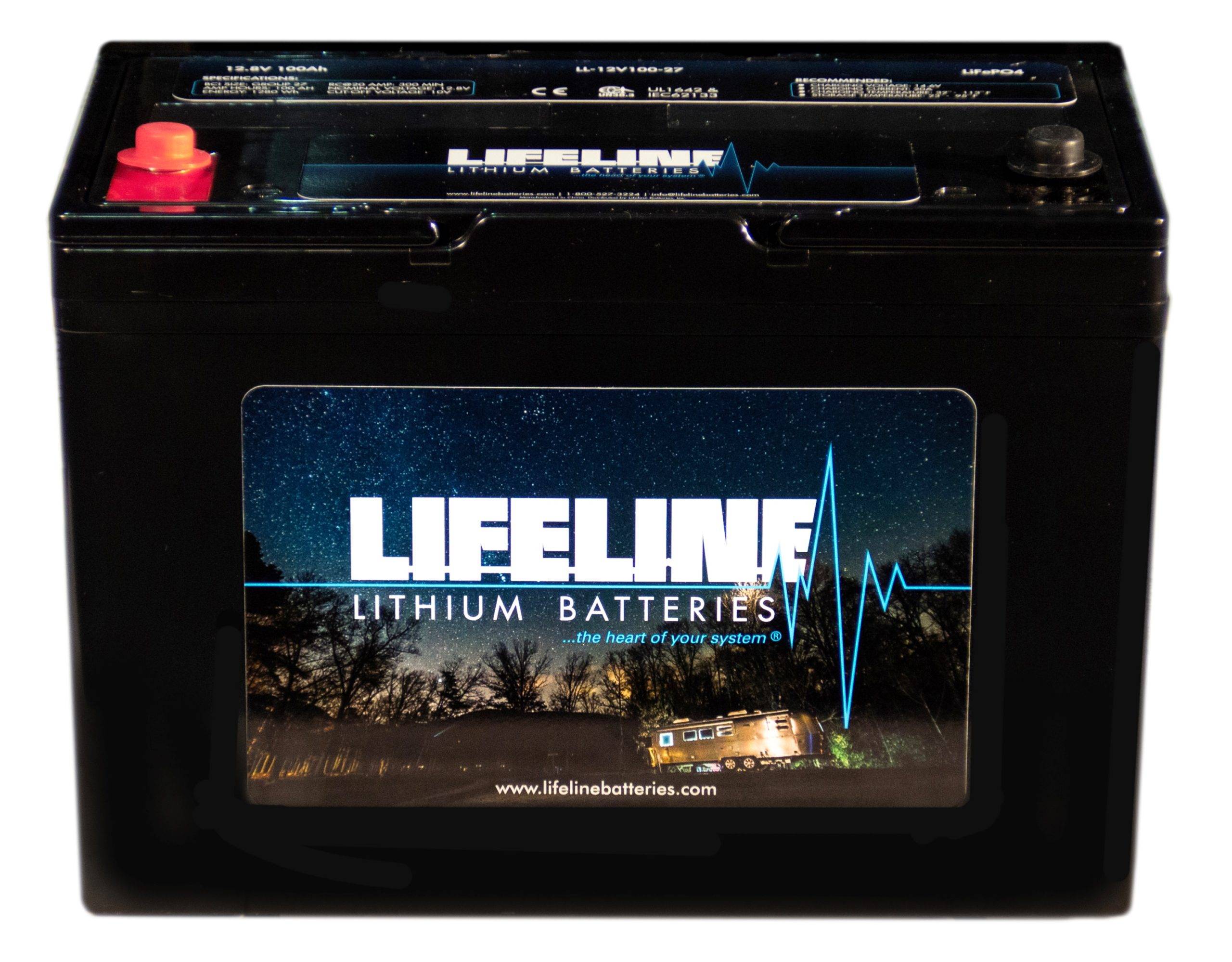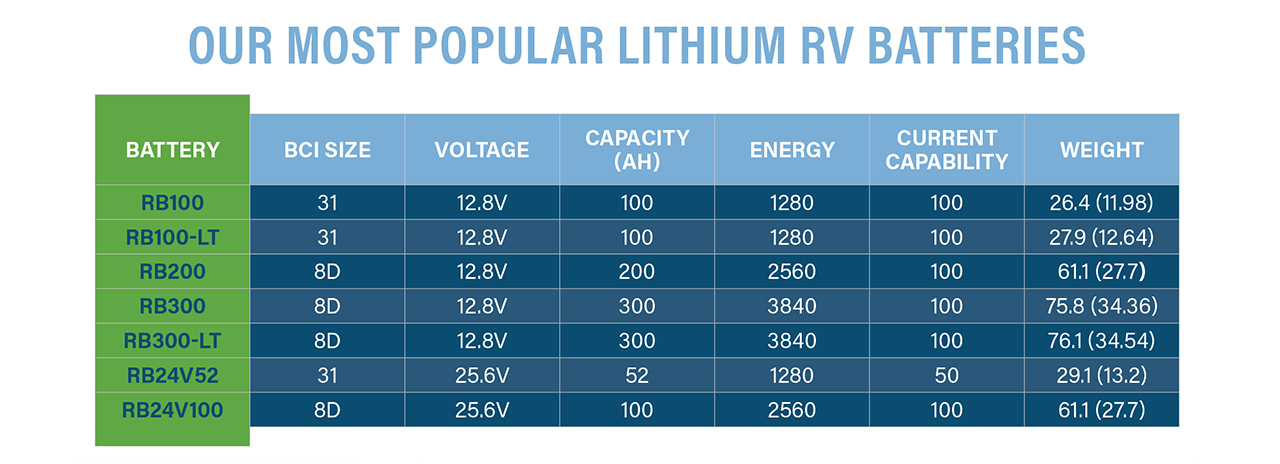Lithium Camper Battery
When it comes to powering your camper, a reliable battery is essential. Lithium camper batteries have emerged as a popular choice among adventurers, offering a range of benefits over traditional lead-acid batteries. With their exceptional energy density, lithium batteries provide more power in a smaller package, making them ideal for off-grid exploration. Additionally, their longer lifespan, faster charging times, and reduced maintenance needs make them an attractive option for those seeking a hassle-free camping experience. In this article, we'll delve into the world of lithium camper batteries, exploring their features, advantages, and what to consider when making a purchase.
- Lithium Camper Battery: The Ultimate Power Solution for Off-Grid Adventures
- Are lithium batteries good for campers?
- Can I just replace my RV battery with a lithium battery?
- Do I need to change my RV converter for lithium batteries?
- What size lithium battery do I need for my RV?
- Frequently Asked Questions
Lithium Camper Battery: The Ultimate Power Solution for Off-Grid Adventures
A lithium camper battery is a type of deep cycle battery designed specifically for recreational vehicles, campers, and motorhomes. These batteries are built to provide a reliable source of power for extended periods, allowing campers to enjoy their off-grid adventures without worrying about running out of juice.
Lithium camper batteries have gained popularity in recent years due to their numerous advantages over traditional lead-acid batteries. Some of the key benefits include:
Lithium Ion Technology: A Game-Changer for Campers
Lithium-ion technology is the core of lithium camper batteries. This technology allows for a higher energy density, meaning more power can be stored in a smaller and lighter package. Lithium-ion batteries also have a longer cycle life, with some manufacturers claiming up to 5,000 cycles or more. This translates to a longer lifespan and reduced maintenance costs.
Deep Cycle Capabilities: Powering Your Camper's Essentials
Lithium camper batteries are designed to handle deep discharge cycles, making them ideal for powering your camper's essential systems, such as lights, refrigerators, and computers. They can also support high-current applications like winches and electric motors. With a lithium camper battery, you can enjoy the comforts of home while still being off the grid.
Fast Charging: Get Back on the Road Quickly
One of the most significant advantages of lithium camper batteries is their ability to charge quickly. Most lithium camper batteries can charge to 80% capacity in under an hour, and some can even charge to 100% in as little as 30 minutes. This means you can get back on the road or resume your camping activities quickly.
Low Maintenance: No More Watering or Equalizing
Lithium camper batteries require minimal maintenance compared to traditional lead-acid batteries. They do not need to be watered or equalized, and they are less prone to sulfation. This means you can focus on enjoying your camping trip rather than worrying about battery maintenance.
Expanded Temperature Range: Performace in Extreme Conditions
Lithium camper batteries can operate in a wider temperature range than traditional batteries, making them suitable for camping in extreme conditions. They can perform well in temperatures ranging from -20°C to 45°C (-4°F to 113°F), ensuring you have a reliable source of power regardless of the weather.
| Feature | Lithium Camper Battery | Traditional Lead-Acid Battery |
|---|---|---|
| Weight | Lighter (approx. 1/3 the weight) | Heavier |
| Energy Density | Higher (more power in a smaller package) | Lower |
| Cycle Life | Longer (up to 5,000 cycles or more) | Shorter |
| Maintenance | Low (no watering or equalizing required) | Higher |
| Temperature Range | Wider (-20°C to 45°C / -4°F to 113°F) | Narrower |
Are lithium batteries good for campers?

Are Lithium Batteries Good for Campers?
Lithium batteries have gained popularity among campers in recent years, and for good reason. They offer several advantages over traditional lead-acid batteries, making them an attractive option for those who love spending time in the great outdoors.
Lightweight and Compact
One of the most significant benefits of lithium batteries is their lightweight and compact design. This makes them ideal for campers who need to transport their gear over long distances or have limited storage space. Lithium batteries are typically 1/3 the weight of lead-acid batteries, making them a great option for campers who want to reduce their overall weight burden.
Longer Cycle Life
Lithium batteries have a longer cycle life compared to lead-acid batteries. This means they can be charged and discharged more times, resulting in a longer lifespan. On average, lithium batteries can last for 300-500 cycles, while lead-acid batteries typically last for around 100-200 cycles.
Faster Charging Times
Lithium batteries charge faster than lead-acid batteries, which is a significant advantage for campers who need to recharge their batteries quickly. They can charge up to 5 times faster than lead-acid batteries, making them ideal for campers who rely on solar panels or generators to recharge their batteries.
Improved Safety
Lithium batteries are safer than lead-acid batteries, as they are less prone to overheating and explosion. They also have a built-in battery management system (BMS) that protects against overcharging, over-discharging, and short-circuiting.
Higher Energy Density
Lithium batteries have a higher energy density than lead-acid batteries, which means they can store more energy per unit of weight and volume. This makes them ideal for campers who need to power multiple devices, such as lights, laptops, and refrigerators.
- Higher energy density allows for more power in a smaller package
- Reduced weight and volume make them ideal for camping
- Improved safety features reduce the risk of overheating and explosion
Can I just replace my RV battery with a lithium battery?

Replacing your RV battery with a lithium battery may seem like a straightforward process, but it's not as simple as just swapping out the old battery for a new one. Lithium batteries have different characteristics and requirements than traditional lead-acid batteries, so it's essential to consider several factors before making the switch.
Compatibility with RV Electrical System
To ensure a smooth transition, you need to verify that your RV's electrical system is compatible with a lithium battery. This includes checking the charging system, inverters, and converters to ensure they can handle the unique characteristics of lithium batteries. A lithium battery requires a specific charging profile, and if your system is not designed to accommodate this, it may not charge the battery correctly or could even damage it.
Advantages of Lithium Batteries
Lithium batteries offer several benefits over traditional lead-acid batteries, including:
- Lighter Weight: Lithium batteries are significantly lighter than lead-acid batteries, which can improve your RV's overall weight distribution and fuel efficiency.
- Longer Cycle Life: Lithium batteries can last up to 5,000 cycles or more, compared to 300-500 cycles for lead-acid batteries.
- Faster Charging: Lithium batteries can charge faster than lead-acid batteries, which can be beneficial for RVers who need to recharge their batteries quickly.
Disadvantages of Lithium Batteries
While lithium batteries offer several advantages, they also have some drawbacks to consider:
- Higher Upfront Cost: Lithium batteries are significantly more expensive than lead-acid batteries, which can be a significant investment for RVers.
- Requires Specialized Equipment: Lithium batteries require specialized charging equipment and monitoring systems to ensure they are charged and discharged correctly.
- Thermal Management: Lithium batteries can be sensitive to temperature extremes, which can affect their performance and longevity.
Installation and Configuration
Installing a lithium battery in your RV requires careful planning and configuration. You'll need to ensure that the battery is properly installed, connected, and configured to work with your RV's electrical system. This may involve:
- Upgrading Electrical Components: You may need to upgrade your RV's electrical components, such as the charging system, inverters, and converters, to ensure they are compatible with the lithium battery.
- Monitoring and Control Systems: You'll need to install monitoring and control systems to track the battery's state of charge, voltage, and temperature.
- Proper Wiring and Connection: The battery must be properly wired and connected to the RV's electrical system to ensure safe and efficient operation.
Safety Considerations
Lithium batteries can be safe when installed and used correctly, but they do pose some safety risks if not handled properly. It's essential to:
- Follow Manufacturer Guidelines: Always follow the manufacturer's guidelines for installation, charging, and maintenance to ensure safe operation.
- Monitor Battery Condition: Regularly monitor the battery's condition, including its state of charge, voltage, and temperature, to prevent overcharging or undercharging.
- Avoid Overheating: Ensure the battery is installed in a well-ventilated area and avoid overheating, which can cause damage or even fires.
Ongoing Maintenance and Upkeep
Lithium batteries require regular maintenance and upkeep to ensure they continue to perform optimally. This includes:
- Regularly Check Battery Condition: Regularly check the battery's condition, including its state of charge, voltage, and temperature, to identify any potential issues.
- Update Firmware and Software: Regularly update the firmware and software of your monitoring and control systems to ensure you have the latest features and improvements.
- Clean and Inspect Electrical Connections: Regularly clean and inspect electrical connections to ensure they are free from corrosion and damage.
Do I need to change my RV converter for lithium batteries?

If you're considering upgrading your RV's battery system to lithium batteries, you might wonder if you need to replace your existing converter as well. The answer is not a simple yes or no, as it depends on various factors.
Compatibility with Lithium Batteries
One crucial aspect to consider is whether your current converter is compatible with lithium batteries. Traditional converters are designed to work with lead-acid batteries, which have different charging characteristics than lithium batteries. Lithium batteries require a more precise charging profile, which may not be provided by your existing converter. If your converter is not lithium-compatible, it may not charge your batteries efficiently or safely.
Understanding Converter Types
There are two primary types of converters: Modified Sine Wave (MSW) and Pure Sine Wave (PSW). MSW converters are more common and less expensive, but they can produce a choppy voltage output, which may not be suitable for lithium batteries. PSW converters, on the other hand, provide a clean, sine wave output, making them a better choice for lithium battery systems.
MSW converters:
+ Less expensive
+ May produce a choppy voltage output
+ Not ideal for lithium batteries
PSW converters:
+ More expensive
+ Provide a clean, sine wave output
+ Suitable for lithium battery systems
Converter Ratings and Capacity
Another essential factor to consider is the converter's rating and capacity. Lithium batteries can charge quickly, and your converter must be able to keep up with the demand. A higher-capacity converter may be necessary to ensure your batteries are charged efficiently. Check your converter's rating and compare it to the capacity of your lithium batteries.
Check the converter's rating (e.g., 30A, 40A, 60A)
Compare it to the capacity of your lithium batteries (e.g., 200Ah, 400Ah, 600Ah)
Charging Profiles and Settings
Lithium batteries require specific charging profiles, which may not be programmable on your existing converter. Lithium batteries need a precise charging curve, and your converter must be able to provide the correct bulk, absorption, and float charging stages. If your converter doesn't offer customizable charging profiles, it may not be suitable for lithium batteries.
Bulk charging stage: rapid charging up to 80% capacity
Absorption charging stage: slower charging to 100% capacity
Float charging stage: maintenance charging to maintain full capacity
Monitoring and Control Systems
A lithium battery system often requires a more advanced monitoring and control system to ensure safe and efficient operation. Your converter may need to integrate with a battery management system (BMS), which monitors the battery's state of charge, voltage, and temperature. If your converter is not designed to work with a BMS, it may not be able to provide the necessary monitoring and control functions.
BMS monitors state of charge, voltage, and temperature
Converter must integrate with BMS for safe and efficient operation
What size lithium battery do I need for my RV?

To determine the size of the lithium battery you need for your RV, you'll need to consider several factors, including your power requirements, budget, and available space. Here's a step-by-step guide to help you choose the right size lithium battery for your RV:
Calculating Your Power Requirements
To determine the size of the lithium battery you need, you'll need to calculate your power requirements. This involves identifying the devices you'll be powering and their respective power consumption rates. Make a list of the devices you'll be using, including lights, laptops, refrigerators, and other appliances. Then, research the power consumption rates of each device in watts (W). Multiply the power consumption rate of each device by the number of hours you'll be using it per day to get the total daily power consumption in watt-hours (Wh).
Determining the Depth of Discharge (DOD)
The depth of discharge (DOD) refers to the percentage of the battery's capacity that's used before recharging. A higher DOD means a larger battery capacity is required. For example, if you want to use 50% of the battery's capacity before recharging, you'll need a larger battery than if you only wanted to use 20%. A higher DOD also reduces the lifespan of the battery.
Choosing the Right Lithium Battery Chemistry
Lithium batteries come in different chemistries, each with its own advantages and disadvantages. The most common lithium battery chemistries for RVs are:
- Lithium Iron Phosphate (LiFePO4): Known for their safety, long lifespan, and high DOD tolerance.
- Lithium Nickel Manganese Cobalt Oxide (NMC): Offers high energy density and a long lifespan, but is more expensive than LiFePO4.
- Lithium Cobalt Oxide (LCO): Has high energy density, but is less safe and has a shorter lifespan than LiFePO4 and NMC.
Considering the Battery's Physical Dimensions
When choosing a lithium battery for your RV, consider the available space and physical dimensions of the battery. You'll need to ensure the battery fits in the designated space and can be properly secured. Consider the height, width, and length of the battery, as well as its weight.
Calculating the Required Battery Capacity
Once you've calculated your power requirements, determined the DOD, and chosen the right lithium battery chemistry, you can calculate the required battery capacity. Use the following formula:
Required Battery Capacity (Ah) = Total Daily Power Consumption (Wh) / (DOD x Nominal Battery Voltage)
For example, if your total daily power consumption is 1000 Wh, you want a DOD of 50%, and the nominal battery voltage is 12V, the required battery capacity would be:
Required Battery Capacity (Ah) = 1000 Wh / (0.5 x 12V) = 167 Ah
In this case, you would need a lithium battery with a capacity of at least 167 Ah to meet your power requirements.
Frequently Asked Questions
What is a Lithium Camper Battery and how does it differ from traditional batteries?
A Lithium Camper Battery is a type of deep cycle battery designed specifically for recreational vehicles, motorhomes, and campers. Unlike traditional lead-acid batteries, Lithium Camper Batteries use lithium-ion technology, which provides a more efficient and reliable source of power. Lithium batteries have a higher energy density, meaning they pack more power per unit of weight and volume, making them ideal for camping and off-grid applications. Additionally, Lithium Camper Batteries have a longer cycle life, with some lasting up to 5,000 cycles or more, compared to traditional batteries which typically last around 500-1000 cycles. This means that Lithium Camper Batteries require less maintenance and can provide a longer lifespan.
What are the benefits of using a Lithium Camper Battery in my RV or camper?
There are several benefits to using a Lithium Camper Battery in your RV or camper. One of the most significant advantages is the increased power capacity, which allows you to run more appliances and devices for longer periods of time. Lithium batteries also have a faster recharge rate, which means you can get back on the road or resume camping sooner. Additionally, Lithium Camper Batteries are lighter and more compact, making them easier to handle and install. They also have a lower self-discharge rate, which means they can hold their charge for longer periods of time when not in use. Furthermore, Lithium Camper Batteries are environmentally friendly, as they contain no toxic heavy metals and are recyclable.
How do I charge and maintain my Lithium Camper Battery?
Charging and maintaining your Lithium Camper Battery is relatively straightforward. It's essential to use a lithium-specific charger, as traditional chargers can damage the battery. A lithium charger will ensure the battery is charged correctly and safely. When charging, make sure to follow the manufacturer's guidelines and avoid overcharging, as this can reduce the battery's lifespan. To maintain your Lithium Camper Battery, it's recommended to keep it stored in a cool, dry place and avoid deep discharging. Regularly checking the battery's state of charge and voltage will also help extend its lifespan. Additionally, it's essential to monitor the battery's temperature, as high temperatures can affect its performance and lifespan.
Can I use my existing electrical system with a Lithium Camper Battery?
In most cases, you can use your existing electrical system with a Lithium Camper Battery. However, it's essential to ensure that your system is compatible with lithium batteries. This may require upgrading your electrical system's components, such as the charger, inverter, and monitoring system. Additionally, you may need to reconfigure your electrical system to take advantage of the Lithium Camper Battery's higher voltage and power output. It's recommended to consult with a professional or the manufacturer's instructions to ensure a safe and successful installation. With the right configuration, a Lithium Camper Battery can provide a reliable and efficient source of power for your RV or camper's electrical system.


